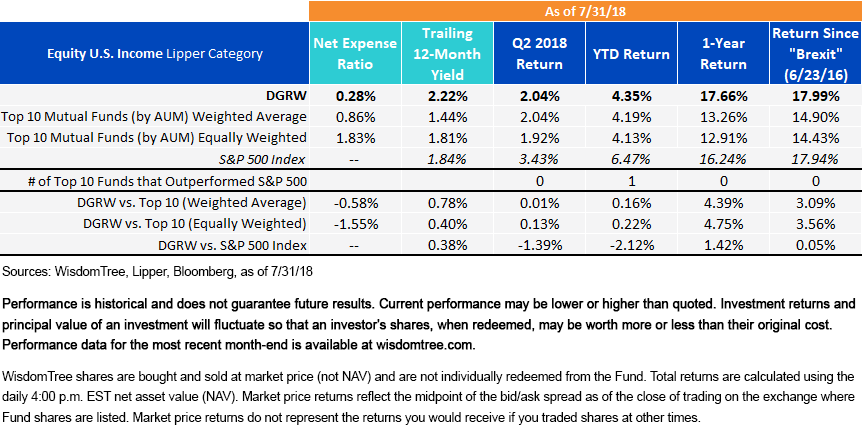Have Your Dividend Strategies Kept Up in a Post-Brexit World?


Despite recent headwinds, dividend strategies continue to attract interest, as dividends themselves have been growing steadily. Additionally, with bond yields broadly still coming off their historical lows, investors are looking for solutions that provide income that is sustainable and can grow with the market.
In the search for yield, many investors have embraced mutual funds, both active and passive, to achieve their desired equity income exposure. However, the largest dividend-focused managers in the space haven’t stacked up well to traditional benchmarks over the last few years.
This is partly due to the rise in interest rates since mid-2016 and the fact that equity income-focused managers typically allocate to more defensive and interest rate-sensitive stocks that have struggled to keep up with the S&P 500 Index. However, it’s curious that global interest rates are rising despite increasing geopolitical risk. In fact, the UK’s referendum on EU membership (aka Brexit) was held on June 23, 2016. In the U.S., 10-year bond yields bottomed on July 8, 2016.
In our view, income-oriented strategies have underperformed due to their persistent under-weights to the technology sector. Historically, tech has a short track record of paying dividends in comparatively small amounts. However, what may surprise people is that, on average, the largest income-focused money managers are currently yielding less than what an investor could get from broad market exposure alone.
The 10 Largest Equity Income Managers: $319 Billion of Assets Lagging the Market
We did a study of the 10 largest mutual funds in the Equity U.S. Income Lipper Category, a group that represents approximately 18% of the entire category’s AUM (or $319 billion of the $1.79 trillion of the total assets under management). We noticed that not a single equity income manager in this group has outperformed the S&P 500 since the Brexit vote. In fact, they have lagged, on average, in performance in nearly all commonly compared periods.
Even more surprising is that, when looking at the current trailing 12-month yields for these funds, these managers have struggled to keep up with the overall market’s dividend yield. One might expect a fund that is income focused to, at the very least, provide an investor with yields competitive to those from pure beta/benchmark exposure.
There’s Quality in Dividends
In our view, WisdomTree’s U.S. Quality Dividend Growth Fund (DGRW) provides a compelling alternative to these traditional equity income managers.
DGRW has a trailing 12-month yield of 2.22%, which surpasses both the average (and weighted average) of the 10 largest Equity U.S. Income Lipper funds and the S&P 500.
More notably, DGRW’s performance since Brexit has surpassed these funds considerably, providing better tracking to the S&P 500 benchmark at an expense ratio that is a fraction of what mutual funds are charging.1
Comparison to Top 10 Mutual Funds by AUM

For standardized performance of DGRW, please click here.
Market Backdrop
This is undoubtedly a challenging macroeconomic climate to be investing in. Interest rates have risen from their mid-2016 lows, while geopolitical risk remains elevated.
Historically, investors have rotated to more defensive and higher-quality strategies during late cycles. We would argue that you can target the quality segment of the market while still benefiting from dividend payers. Dividend and value strategies have lagged the market over the last few years. However, adding a quality-focused tilt to the traditional value strategy may be prudent to help generate better future performance.
We believe that by focusing more on fundamentally sound companies poised for dividend growth, and less on who pays the highest dividends, investors can strike the perfect balance between quality and growth in their overall equity income exposure.
Traditional dividend strategies with backward-looking growth screens may fail to capture these opportunities.
Why we believe in dividend growers for the current environment.
1DGRW’s expense ratio is 0.28%. Ordinary brokerage commissions apply.
Important Risks Related to this Article
There are risks associated with investing, including possible loss of principal. Funds focusing their investments on certain sectors may be more vulnerable to any single economic or regulatory development. This may result in greater share price volatility. Please read the Fund’s prospectus for specific details regarding the Fund’s risk profile.
To learn more about exchange-traded products (ETFs) and mutual funds, please visit this WisdomTree article that explains in great detail the differences and similarities between both fund structures that investors need to know about.
Sources: Thomson Reuters Lipper, WisdomTree, Bloomberg, as of 7/31/18, unless otherwise stated. The analysis uses the top 10 largest mutual funds (by AUM) in the Equity U.S. Income Lipper Category. For funds with multiple share classes, the share class with the highest trailing 12-month yield was used for conservative comparison purposes. Only funds with publicly available data and a live history of at least 12 months were used in the analysis. “Equity Income Funds” as classified by Thomson Reuters Lipper are “Funds that, by prospectus language and portfolio practice, seek relatively high current income and growth of income by investing at least 65% of their portfolio in dividend-paying equity securities.”


